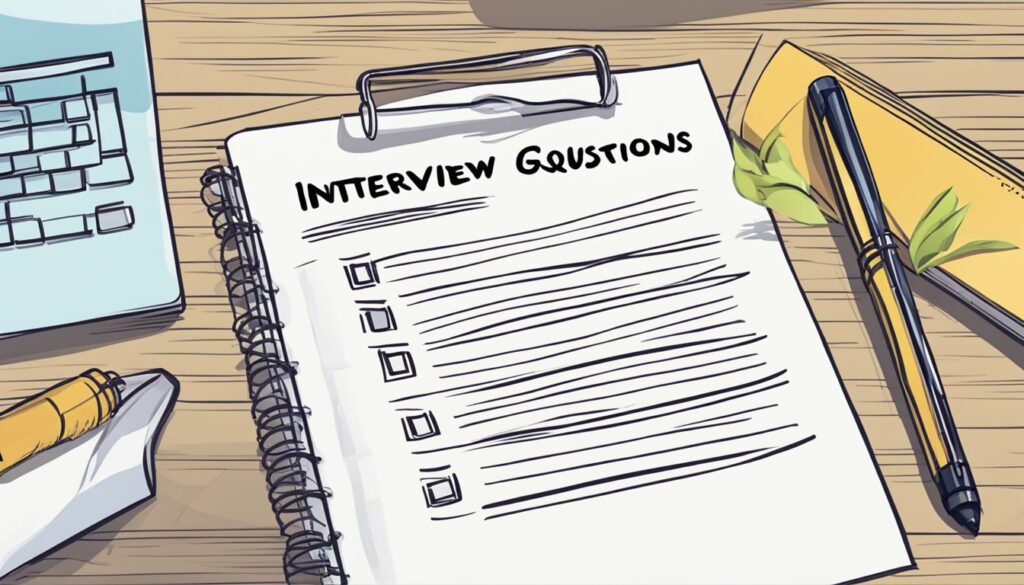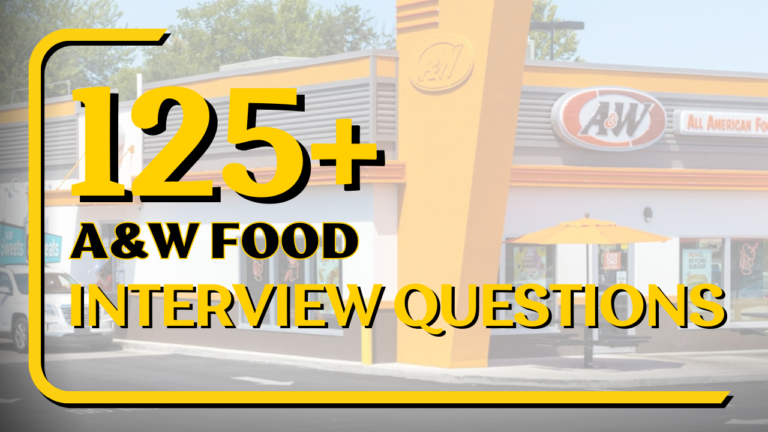150+ Food Service Interview Questions: Sure Shot Success for Hospitality Job Meeting

Engaging in a food service interview requires solid preparation and an understanding of what potential employers are looking for. This post will delve deep into sure shot 150+ Interview questions for your success in food service industry interview.
When you attend an interview for a position in the food service industry, be ready for questions that explore your experience, your ability to work in a team, and how you handle the pressure of a fast-paced environment.
Your responses should reflect a blend of your technical skills, like food preparation and safety, and soft skills, such as customer service and adaptability.

As you prepare for your interview, anticipate inquiries about your past work experiences, especially those that pertain to the culinary and hospitality sectors.
The interviewer is likely to assess your ability to contribute to a diverse team setting, manage high-stress situations, and ensure customer satisfaction. You might also face scenario-based questions that aim to evaluate your problem-solving abilities and how you apply your knowledge in real-life situations.
By thoroughly preparing for these aspects, you position yourself as a strong candidate equipped to excel in the food service industry.
- Food Service Interview General Questions (with Sample Answers)
- 10 Common Interview Topics (Food Service Interview Questions with Sample Answers)
- List of 100 Food Service Interview Questions
- Experience and Employment History ( Food Service Interview )
- 10 Customer Service and Conflict Resolution Food Service Interview Questions and Answers
- 10 Food Safety and Cleanliness for Food Service Interview
- Handling Orders and Complaints
- 10 Behavioral and Situation-Based Food Service Interview Questions with Sample Answers
- After the Interview
Food Service Interview General Questions (with Sample Answers)
When you’re preparing for a food service interview, anticipate a variety of general questions that aim to understand your personality, experience, and skills.
Here’s a structured list to help you get ready:
Q1: Can you tell me a little about yourself?
A : Provide a brief background highlighting previous food service roles and mention key professional traits that are relevant to the role.
Q2: Why do you want to work in the food service industry?
A : Mention your passion for customer service and food, and relate it to the job’s requirements.
Q3: What does excellent customer service mean to you?
A : Describe providing timely, friendly, and efficient service that exceeds customer expectations.
Q4: How do you handle stressful situations?
A : Discuss your ability to remain calm under pressure and use specific examples to illustrate this.
Q5: Can you give an example of how you dealt with a difficult customer in the past?
A : Choose an instance where you successfully resolved a customer complaint and ensured customer satisfaction.
Q6: How would you deal with an unhappy customer’s feedback?
A : Explain the importance of listening actively, apologizing sincerely, and taking action to correct the issue.
Q7: Are you comfortable working in a fast-paced environment?
A : Affirm your capability and willingness to maintain high-quality work even when it gets busy.
Q8: Do you have any food handling certifications?
A : Mention any relevant certifications, such as a food handler’s card, or your willingness to obtain them.
Q9: What do you consider your greatest strength in a food service setting?
A : Identify a key strength that contributes positively to food service operations, such as multitasking or communication.
Q10: How do you ensure accuracy when taking and preparing orders?
A : Discuss your attention to detail and procedures you follow to avoid mistakes, such as repeating orders back to customers.
Prepare your responses to these questions, ensuring your answers are honest and reflect your genuine experiences and approach to work in the food service industry.
10 Common Interview Topics (Food Service Interview Questions with Sample Answers)
When preparing for a food service interview, be ready to discuss your previous work experience and how it has equipped you with the skills necessary for the role at hand.
You’ll be asked about your understanding and implementation of food safety, as well as your ability to maintain a clean work environment in compliance with health codes. Interviewers will also assess your customer service capabilities, including how you manage orders and customer complaints.
Expect questions geared towards evaluating your problem-solving skills and your proficiency in communication. You’ll need to demonstrate how you can contribute to a successful food service team through examples of past teamwork, conflict resolution with difficult customers or coworkers, and a strong work ethic.
Here’s a sample list of food safety interview questions and answers you might encounter:
- Can you share an experience where you successfully handled a customer complaint? A: “Certainly. Once, a customer was unhappy with their meal. I listened attentively, apologized sincerely, and promptly offered to replace the meal, which resolved the issue and the customer left satisfied.”
- How do you ensure food safety and proper sanitization in the workplace? A: “I always follow established food safety guidelines, like proper handwashing and food storage techniques, and ensure that surfaces are sanitized regularly to comply with health codes.”
- Describe a time you had to keep track of multiple orders simultaneously. A: “During a particularly busy shift, I managed multiple orders by staying organized, clearly communicating with the kitchen, and promptly updating customers to manage their expectations.”
- How do you approach conflict resolution with a coworker? A: “I approach conflicts professionally by listening, discussing the issue calmly to understand their perspective, and working together to find a mutual solution.”
- What qualifications do you have that make you a good fit for this job? A: “My experience working in fast-paced environments, strong customer service skills, and my food handler certification make me well-qualified for this role.”
- Tell us about your previous job and how it relates to this position. A: “In my previous job, I worked as a server where I honed my customer service skills, learned how to navigate a busy dining room, and contributed positively to team dynamics.”
- How would you deal with difficult customers? A: “With difficult customers, I remain calm, listen to their concerns, validate their feelings, and work towards an amicable solution.”
- What is your experience with inventory and ordering supplies from vendors? A: “I have experience managing inventory by tracking stock levels, forecasting needs, and coordinating with vendors to ensure timely delivery of supplies.”
- Can you explain your work ethic and how it will help you contribute to a successful food service team? A: “My work ethic is centered around reliability, quality service, and continuous improvement, which aligns with the goals of a successful team.”
- In your opinion, what is the key to effective teamwork in a food service setting? A: “Effective teamwork requires clear communication, mutual respect, and each member taking responsibility for their role while being willing to support one another.”
List of 100 Food Service Interview Questions

When preparing for a food service interview, consider the following questions:
- Can you tell us a little about yourself?
- Why do you want to work in the food service industry?
- What is your previous experience in food service?
- How would you handle a difficult customer?
- Describe a time you worked well as part of a team.
- What do you think is the key to excellent customer service?
- How do you handle high-pressure situations?
- What are your greatest strengths and weaknesses?
- How do you ensure food safety and hygiene standards are met?
- What is your availability?
- How would you deal with a complaint about food quality?
- Describe your cash handling experience.
- Are you familiar with point-of-sale systems?
- What do you know about our restaurant/food service establishment?
- Can you work on your feet for long periods?
- How would you contribute to a positive team environment?
- How do you stay organized and manage time during a busy shift?
- How would you help create a memorable experience for customers?
- Describe a situation where you had to solve a problem quickly.
- Have you ever implemented a process to improve efficiency?
- Why should we hire you?
- What motivates you at work?
- How do you keep up with food industry trends?
- Describe your understanding of portion control.
- Are you comfortable preparing food in front of guests?
- What techniques do you use to upsell menu items?
- Can you adapt to a changing menu or specials?
- Tell me about a time you had to multi-task.
- What are your long-term career goals in food service?
- How do you handle constructive criticism from supervisors?
- What steps would you take in the event of a health code violation?
- Are you certified in food handling or safety?
- How would you deal with running out of a popular menu item?
- How important is presentation when serving food?
- What is the most challenging aspect of food service for you?
- How do you plan to stay motivated during slow periods?
- Can you describe your experience with inventory management?
- Have you trained or managed other staff before?
- What’s your favorite menu item to prepare or serve, and why?
- How do you handle unexpected rushes during service?
- Why do you want to leave your current job?
- How do you ensure consistency in food quality?
- What would you do if you noticed a coworker not following safety standards?
- How do you handle feedback from customers?
- Can you operate kitchen equipment safely?
- Describe a time when you went above and beyond for a customer.
- How has your previous experience prepared you for this role?
- What would you do if you were short-staffed on a busy day?
- Do you have experience in special dietary needs and allergens?
- How do you feel about working holidays and weekends?
- Discuss your experience with food prep and portioning.
- What do you bring to the team that’s unique?
- Are you effective at managing your stress?
- How quickly can you learn a new menu?
- What strategies do you use for memorizing menu details?
- Have you ever dealt with an emergency in the workplace?
- Describe how you would close the restaurant at the end of the day.
- What is your favorite aspect of working in food service?
- How would you manage a disagreement with a coworker?
- Have you worked in customer service roles outside of food service?
- Can you walk us through a typical work shift of yours?
- How do you anticipate customers’ needs?
- What is your approach to food waste management?
- How do you stay current with food and beverage regulations?
- Can you give an example of how you have handled a food recall?
- What do you do if a dish is returned by a customer?
- Do you have experience with food ordering and supply management?
- How would you ensure that every guest leaves satisfied?
- Can you work independently without direct supervision?
- Are you able to communicate effectively with kitchen staff?
- Have you ever helped improve a process or increase sales?
- Can you explain how you follow a recipe exactly?
- What techniques do you use to maintain a clean work environment?
- How would you react if a coworker was not adhering to dress code?
- Discuss a time when you encountered a difficult situation with a supplier.
- What makes you passionate about food and customer service?
- How do you prioritize tasks during your shift?
- What role do teamwork and communication play in a kitchen?
- How familiar are you with health and safety regulations in the kitchen?
- Can you discuss your experience with different cuisines?
- What would you do if you made a mistake with a customer’s order?
- How would you handle a situation where a customer is unhappy with their wait time?
- Are you able to lift and carry heavy items as required?
- How well do you cope with repetitive tasks?
- Can you provide an example of your attention to detail?
- What’s your experience with seasonal menu changes?
- How important is speed in a fast-paced food service environment?
- Have you ever had to deal with a foodborne illness incident?
- Can you discuss any restaurant technology you’re experienced with?
- How would you rate your culinary skills?
- What are your expectations for a typical workweek in food service?
- Are you experienced with any special service styles (buffet, family-style, etc.)?
- What is your process for ensuring customer orders are accurate?
- How would you respond if you received conflicting instructions from two managers?
- Have you ever had to adapt quickly to a menu change?
- How comfortable are you making recommendations to customers?
- Can you explain how you’d perform an end-of-day cash up?
- How much importance do you place on food presentation?
- How do you balance speed with maintaining food quality?
- How would you represent our brand to patrons?
Tailor your responses to reflect your personal experiences, and be prepared to discuss your answers in-depth during the interview.
Experience and Employment History ( Food Service Interview )

When interviewing for a position in the food service industry, your experience and employment history will be one of the main areas of focus. Interviewers are interested in your hands-on experience and any previous job roles that may contribute to your effectiveness within a new team.
Question: Have you worked in the food service industry before?
A: Yes, I have worked in various roles including a server, line cook, and shift manager.
Question: Can you describe your responsibilities in your last food service job?
A: In my last position, I was responsible for managing a team of servers, ensuring food quality standards were met, and handling customer service inquiries.
Question: What qualifications do you possess that make you a good fit for the food service industry?
A: I am certified in food safety and have completed a professional hospitality course, which has equipped me with key skills for the industry.
Question: What do you consider the most important qualities in a successful food service team?
A: Communication, efficiency, and a commitment to customer satisfaction are crucial for a successful food service team.
Question: Can you provide an example of a time when you improved efficiency in your workplace?
A: Certainly, at my previous job, I implemented a new scheduling system that reduced staff wait times and increased overall productivity.
Question: How do you handle stressful situations during busy periods?
A: I prioritize tasks, communicate clearly with the team, and keep a level head to maintain smooth operations.
Question: Tell us about a time you provided excellent customer service.
A: Once, a customer had a dietary restriction, and I worked with the chef to create a special dish, which the customer greatly appreciated.
Question: In what ways have you contributed to a positive team environment in the past?
A: I frequently acknowledged my colleagues’ hard work and fostered a culture of mutual support and respect.
Question: Describe your experience with point-of-sale systems and cash handling.
A: I am proficient with several point-of-sale systems and have accurately handled daily cash and credit transactions for over three years.
Question: Why did you leave your last food service job?
A: I left to pursue further education in hospitality management and am now seeking to apply my enhanced skills in a dynamic new setting.
10 Customer Service and Conflict Resolution Food Service Interview Questions and Answers
In the context of food service, your ability to provide exemplary customer service and resolve conflicts efficiently can be pivotal to your success. Below is a list of questions that you might encounter during an interview, along with potential responses highlighting your skills in dealing with difficult customers and conflict resolution scenarios.
- How do you handle a customer who is unhappy with their meal?
A: I apologize for any inconvenience caused and ask for specific details about their dissatisfaction. I then offer to replace the item or provide an alternative solution based on their preference, ensuring that they feel heard and valued. - Can you give an example of a time when you effectively resolved a customer complaint?
A: Once a customer received a delayed order during a rush. I apologized, explained the situation, offered a discount on their current meal and a complimentary item for their next visit. This turned a negative experience into a positive one, and the customer returned. - Describe how you would manage a situation with an irate customer.
A: I stay calm and listen attentively, acknowledging their feelings without taking it personally. I then work swiftly to address their concerns and provide a satisfactory solution. - What steps do you take to ensure customer satisfaction?
A: I pay close attention to their needs and promptly act to meet or exceed their expectations, ensuring a welcoming atmosphere and providing consistent quality service. - How would you deal with a customer who refuses to pay for their meal?
A: I would calmly discuss the issue to understand the reason, suggest solutions such as discussing it with a manager, and aim to resolve the situation amicably to maintain a positive relationship. - What’s your approach to handling multiple customers during peak times?
A: I prioritize tasks, communicate clearly with team members, and maintain a professional demeanor to serve each customer efficiently without compromising service quality. - How do you handle negative feedback from a customer?
A: I view negative feedback as an opportunity to improve. I listen carefully, thank the customer for their input, and then take steps to implement changes to prevent a recurrence. - How do you ensure a conflict does not escalate further?
A: By addressing the issue quickly, maintaining a composed and respectful tone, and offering a fair resolution in line with the establishment’s policies. - What would you do if a customer complained about another customer’s behavior?
A: I would assess the situation discreetly, approach the other customer respectfully if appropriate, and resolve the matter in a manner that ensures the comfort and safety of all patrons. - Have you ever had a disagreement with a team member in front of customers? How was it handled?
A: While I strive to keep interactions with team members professional at all times, if a disagreement occurs, I suggest moving the discussion away from the customer’s view and resolving it privately.
10 Food Safety and Cleanliness for Food Service Interview
- Q: How do you ensure food safety when handling raw ingredients? A: You should maintain separate cutting boards for raw and cooked foods to avoid cross-contamination. Always wash your hands thoroughly before and after handling raw items.
- Q: Can you describe the steps you take to sanitize work surfaces? A: Clean surfaces first with soap and water, then apply a sanitizer solution following the manufacturer’s directions. Allow the surface to air dry to ensure effectiveness.
- Q: What temperature should meats be cooked to ensure they are safe to eat? A: Cook all poultry to an internal temperature of 165°F, ground meats to 160°F, and steaks or roasts to at least 145°F, checking with a food thermometer.
- Q: What is your process for washing hands correctly in a food service environment? A: Wet your hands with warm water, apply soap, lather for at least 20 seconds, then rinse and dry with a disposable towel, and use the towel to turn off the faucet.
- Q: How do you prevent cross-contact of allergens in the kitchen? A: Always clean and sanitize all surfaces, utensils, and equipment before preparing allergen-free meals. Store allergens separately and clearly label containers.
- Q: What are the ‘Danger Zone’ temperatures for food storage? A: The ‘Danger Zone’ is between 40°F and 140°F. You must keep cold foods below 40°F and hot foods above 140°F to prevent bacterial growth.
- Q: Explain your understanding of Health Codes in relation to food safety. A: Health codes are regulations meant to ensure public health by governing food safety practices, including proper cooking, storage, and handling of food items.
- Q: How do you manage food recalls in a restaurant setting? A: You should immediately remove the affected product from inventory, follow the recall instructions, and communicate with staff and guests as necessary.
- Q: What is the proper way to store cleaning chemicals in a kitchen? A: Store chemicals in a well-ventilated space separate from food items, clearly label all containers, and ensure they’re in a secure place to prevent spills.
- Q: How often should food-contact surfaces be cleaned and sanitized? A: Clean and sanitize surfaces after each task or when switching between different food types. Regularly check surfaces throughout the day for cleanliness.
Handling Orders and Complaints

When interviewing for a food service position, it’s essential to demonstrate your ability to handle orders accurately and manage customer complaints effectively. Below is a list of questions that you might encounter during an interview, along with answers that reflect competence in these areas.
Q: How do you ensure accuracy when taking a customer’s order?
A: I repeat the order back to the customer to confirm details and use a systematic approach for inputting it into the POS system.
Q: What steps do you take if you realize you have made a mistake with an order?
A: I quickly acknowledge the mistake, apologize to the customer, and take immediate action to correct it.
Q: Can you describe a time when you effectively resolved a customer complaint?
A: Yes, a customer once received a dish they weren’t satisfied with. I listened attentively to their concerns, offered an apology, and provided a replacement in a timely manner.
Q: How do you handle a situation where a customer’s order is taking longer than expected?
A: I inform the customer about the delay, offer sincere apologies, and provide updates as the order progresses.
Q: What is your method for keeping track of multiple orders during busy shifts?
A: I prioritize orders by time of placement and use visual or digital cues to manage the workflow efficiently.
Q: How do you respond to a customer who is unhappy with their meal?
A: I address their concerns with empathy, offer solutions such as a new dish or refund if necessary, and ensure they feel heard and valued.
Q: Describe how you would handle a wrong food order complaint.
A: I would immediately apologize for the inconvenience, rectify the error by expediting the correct order, and offer something complimentary as a gesture of good will.
Q: How do you prioritize customer complaints?
A: I assess the severity and impact of the complaint, giving urgent attention to those affecting customer satisfaction directly.
Q: In what ways do you prevent orders from being mixed up?
A: By clearly labeling orders and maintaining clear communication with the kitchen and service staff.
Q: How would you calm down an irate customer who has had a negative experience?
A: I remain calm and professional, listen to their issue, empathize with their frustration, and offer solutions to resolve the situation satisfactorily.
10 Behavioral and Situation-Based Food Service Interview Questions with Sample Answers
When you attend a food service interview, be prepared to answer questions beyond your technical skills. Interviewers often look for your ability to handle real-world situations—how you interact with customers, work in a team, and address challenges. Below is a list of common behavioral and situation-based questions along with potential answers to consider.
- Describe a time when you had to work in a fast-paced environment. How did you manage your tasks? A: Your answer could emphasize your ability to prioritize tasks and remain calm, ensuring efficiency and quality of service.
- Talk about a situation where you had to solve a problem quickly. What steps did you take? A: Focus on your problem-solving process, including any quick decision-making and actions you implemented to resolve the issue.
- How do you handle stress on the job? Can you provide an example? A: Mention stress management techniques such as taking deep breaths or breaking tasks down into smaller steps to avoid feeling overwhelmed.
- Tell me about a time you dealt with a difficult customer. What was the outcome? A: Highlight your communication skills and patience, explaining how you turned a negative situation into a positive experience.
- Discuss a situation where you had to communicate a change in regulations to your team. A: Speak to your ability to stay informed on health and safety regulations and your communication effectiveness in informing and training your team.
- Have you ever had to work quickly under pressure? Give an example of how you succeeded. A: Share a specific occasion when time constraints were tight and your ability to maintain a positive attitude and work efficiently resulted in success.
- What motivates you to take pride in your work within the hospitality industry? A: Discuss personal satisfaction from providing exceptional service, contributing to a successful business, and a passion for hospitality.
- How have you demonstrated flexibility when dealing with unexpected changes during your shift? A: Provide an instance where you adapted to change swiftly without disrupting service.
- Can you give an example of how teamwork helped you handle a particularly busy period? A: Recall an event where collaboration with your colleagues enabled you to handle high customer volume effectively.
- Why is having a positive attitude important in food service, and how do you maintain it? A: A positive outlook can improve customer experiences and the work environment, maintaining it through focus on positive interactions and successful outcomes.
After the Interview
Once you’ve completed your food service interview, it’s important to focus on personal development and how it can enhance your future performance. Your ability to self-assess, maintain a positive attitude, and continue professional development are crucial in demonstrating your value as an employee.
Continuing Professional Development
Self-Assessment: After the interview, take time to reflect on your performance. Identify the strengths you showcased in communication and positive attitude, and consider areas where you can improve accuracy and attention to detail. Be honest with yourself about your experience and motivation. This self-assessment is a vital training component, guiding you in where to focus your development efforts.
- Training and Certifications: Stay ahead by seeking out additional training opportunities. Enhance your skill set with certifications relevant to the food service industry, which can include food safety, customer service, or even management training. Here’s a quick list of actions you might consider:
- Enroll in food safety certification courses.
- Attend workshops on effective communication strategies.
- Look for online resources to improve specific skills such as cash handling or menu knowledge.
Remember that the intersection of experience and ongoing training is where you often find growth.
Boldness in Communication: Your interview is a chance to display strong communication skills. Afterward, be proactive in following up with the employer, confirming your continued interest in the position, and thanking them for the opportunity to interview. Use this as yet another opportunity to communicate your enthusiasm and dedication to excellence in service.






